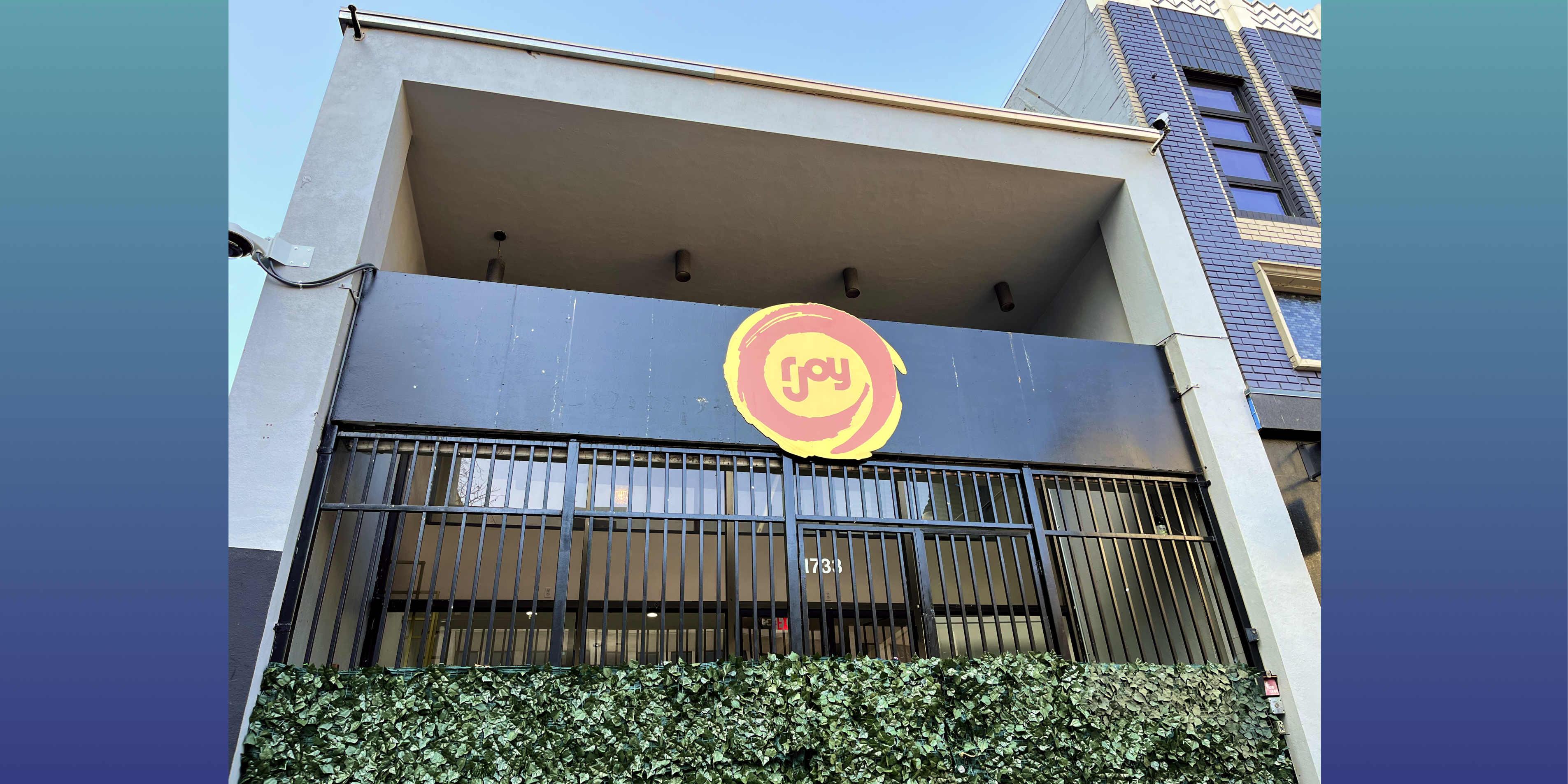“We need to have these healing spaces in urban environments, in the middle of downtown Oakland, in a place that’s seen as harsh and violent and potentially unsafe—all these ideas about what it means to be in an urban environment. We wanted to create an oasis of healing, of peace, of liberation, of freedom.”
-Dr. Teiahsha Bankhead Executive Director of Restorative Justice for Oakland Youth (RJOY)
Physical spaces are an important part of holistic healing—especially in communities that experience high rates of violence, poverty and displacement. For the nonprofit Restorative Justice for Oakland Youth (RJOY), ensuring that their physical headquarters is a welcoming environment that centers BIPOC communities is a key part of their work to increase mental health and wellness.
Founded in 2005 by former civil rights attorney Dr. Fania Davis, RJOY strives to end cycles of youth violence and incarceration in BIPOC and underrepresented communities. Using restorative justice principles, which focus on mending broken relationships to create a better future, RJOY works to reduce racism and related trauma and create spaces for truth-telling, racial healing and reparation.
Throughout their history, RJOY has partnered with Oakland Unified School District, Alameda County and other agencies to bring mental health services, violence prevention and restorative justice practices into schools, juvenile justice systems and the broader community. Though founded and headquartered in Oakland, RJOY has become a thought leader across the state and the nation in race-conscious restorative justice. With much of their work rooted in African indigenous practices, RJOY has also facilitated educational exchanges and trainings in several countries in Africa.
Over the past few years, RJOY has experienced tremendous growth in their staff as well as the programs they offer in the community, including weekly restorative circles they host in their offices. Having outgrown their West Oakland location, RJOY needed to find a place that would provide more space that also had options for privacy and confidentiality.
“The restorative circles require a level of truth-telling, authenticity and confidentiality. It’s very difficult to do that in big open spaces,” said Dr. Teiahsha Bankhead, Executive Director of RJOY. “It’s important to create a physical container, not just an emotional container, for the disclosure of intimate details of people’s struggles. Before, we had one big open space, one conference room and my office—three potential places where folks could meet, and only two of those places had closed doors.”
As RJOY’s leadership sought a new headquarters, they decided to look in downtown Oakland. Much of RJOY’s work is rooted in indigenous African healing practices, in which the earth and the elements are all a part of the psychological, physiological, spiritual and emotional healing process. To provide more people with the opportunity to engage in holistic health and wellness, RJOY purchased a farm a couple of hours outside of the city, the Ubuntu Healing Center. However, they also wanted their headquarters to be an accessible space even closer to home.
“The reason that we were interested in purchasing a building in downtown Oakland as our headquarters is that we knew at the time that we could only bring so many people two and a half hours away to our farm for that immersive experience,” Dr. Bankhead said.
“We need to have these healing spaces in urban environments, in the middle of downtown Oakland, in a place that’s seen as harsh and violent and potentially unsafe—all these ideas about what it means to be in an urban environment. We wanted to create an oasis of healing, of peace, of liberation, of freedom. And we really wanted to center the experiences of Black indigenous people in that environment,” said Dr. Bankhead.
RJOY identified 1733 Broadway Street, a two-story building in the heart of downtown Oakland, as their new headquarters. The location not only quadruples RJOY’s space, but it is also very transit-accessible for the community. As RJOY prepared to purchase 1733 Broadway, they reached out to Community Vision. In 2022, we partnered with the organization to provide a $2.1 million acquisition loan.
“I feel like it was easier and better to work with Community Vision in some ways because you are not a bank or a credit union. You have flexibility that is very, very useful to nonprofits,” Dr. Bankhead said.
RJOY officially moved into their new home in March 2023. The organization is currently finishing final touches, including a few more renovations and exterior updates. RJOY’s headquarters now offers them 16 offices, two conference rooms and five bathrooms. They also have a large kitchen area, showers, a washer and dryer, a music studio, a yoga studio, a meditation room and several hangout spaces—including an area with a pool table.
The nonprofit plans to hold regular yoga and dance classes, reflective art sessions and many other opportunities for the community to engage in psychosomatic healing.
“All of these spaces together create a welcoming environment. We have a center for holistic healing that’s focused on BIPOC communities and people who otherwise wouldn’t have free and equitable access to wellness promotion resources, or to an environment that is aware of the somatics and really integrates holistic healing and trauma healing” said Dr. Bankhead.
In addition to their programs, RJOY plans to use their new location to support the community in other ways. The organization occupies about 60% of the building, and the remaining space will be transformed into co-working space for local BIPOC-led organizations, offices for a local Black woman-owned business who will be a permanent tenant and retail space to sell wellness products in the community.





